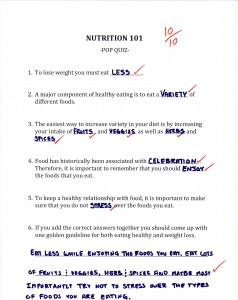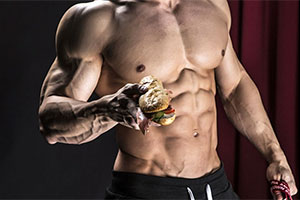I’m right in the middle of a series of home renovations. There is dry wall dust everywhere, but it is finally coming together starting to really take shape.
Since we are finishing our basement, one of the things I had to do was to move all of my files from the basement into their TEMPORARY home in my office (Temporary – because they’re going back into the basement as soon as possible!)
In amongst all of the papers, I found a series of notes from my first year nutrition classes.
Curious, I started reading through the notes. Guess what I found?
WAY too many scientific papers. WAY too much minutia. WAY too much ‘small picture’ type stuff AND a whole bunch of OCE thinking.
Really, my first year notes were full of enzyme pathways, redox reactions and some hard core biochemistry.
This was FIRST YEAR UNIVERSITY!
Talk about putting the cart before the horse.
If I could design a nutrition course…I’d start basic, really basic.
We would study super basic concepts, and build a strong foundation.
Then we would study the application of statistical analysis.
Then we would study scientific methodology and how to design a study.
Then (and only then) we would finally investigate the origins of our current nutritional beleifs, studying research from as far back as the 1890’s.
Finally (maybe after 2 or 3 years) we would start reviewing more current studies, when we finally have enough statistical, historical and methodological background to actually UNDERSTAND how these studies fit into the TOTAL BODY OF NUTRITIONAL SCIENCE.
Nutrition (like any science) is like a pyramid – you need a STRONG foundation to build upon. If you only ever investigate what’s on top you never get the big picture.
And if you don’t know the foundation, and only ever write about the small little top portion – well that’s how we get pseudoscience nonsense.
In fact, if I had my way, this would be the very first test you would get in first year Nutrition 101.
(CLICK ME)
Simple and easy, and starts with a basic philosophy to build upon. It includes basic science, an understanding of the psychology behind eating and it meets the need for practicality in our nutrition and diet recomendations.
With out a proper foundation we get scientific illeteracy in the people promoting health.
Very scary.
If you are studying nutrition, or reading diet books always try to determine whether or not the author understands the basic fundamentals, or if they are just blinding you with scientific nonsense.
BP









